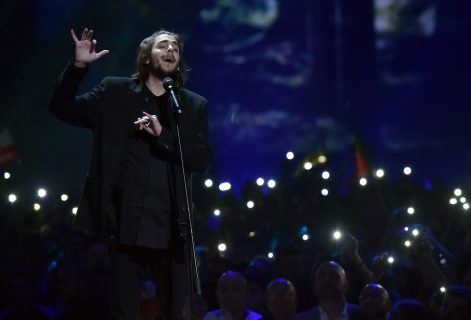
LISBON, Portugal (AFP) – A few weeks ago, Salvador Sobral, a 27-year-old crooner tipped as a favorite for Saturday’s Eurovision Song Contest, was an unknown artist waiting for a heart transplant.
But with his intimate rendering of the melancholic “Amar Pelos Dois” (For the Both of Us) written by his older sister Luisa — a success in her own right — Sobral is hoping to chart an unconventional route to Eurovision gold.
At first glance, his decision to forgo the elaborate choreography and heavy dance tempos favored by most contestants would make him a long shot.
Shunning English to sing in a Portuguese tremolo that reflects a severe heart condition would also seem to bode ill for the Lisbon native, whose beard and ponytail make him look more of a hipster than a budding pop star.
“I don’t like pointless ‘fast food’ music, my songs have to have meaning, I sing with my heart,” he said recently.
Something to say
Sobral has become the bookmakers’ top contender after the Italian Francesco Gabbani and his “dancing naked ape,” and a favorite of fans, with huge crowds welcoming his arrival at the Eurovision venue in Kiev, Ukraine.
“I felt as popular as Cristiano Ronaldo,” said Sobral, who added that he was not making the trip only to sing.
After the Eurovision semi-finals Sobral held a press conference wearing a sweatshirt calling attention to the plight of refugees.
“When I learned that I was going to participate at Eurovision I first thought about the refugees, because they leave their country to escape death. These people are not just simple immigrants,” he said.
Sobral, for his part, cannot go anywhere for more than two weeks without his medicines, and he did not attend the rehearsals earlier this week in Kiev because of health worries.
But he plays down his heart ailment, even though he is still waiting for a transplant.
“The disease is a small problem, really, certainly the only one I have in my life.”
High and lows
Discovered in 2009 while competing in Portugal’s version of “American Idol” — as his sister had a few years previously — Sobral was barely 18 and had a hard time adjusting to his sudden popularity.
He quit singing shortly afterwards, and in 2011 he left Portugal for Spain’s Balearic Islands, where he studied psychology during an Erasmus program.
It was during this time Sobral fell into heavy drug use, including regular use of psychedelic mushrooms.
But he gradually cleaned himself up and started singing in the bars and hotels on Mallorca.
“It was hard to sing every night until midnight, but it was worth it,” he said recently.
“I thought about staying on the island, but when I saw that nothing happens there in winter, I knew I had to make a decision.”
So he left for Barcelona to study jazz and work on his voice, and it was in the Catalan city that he discovered Chet Baker, the trumpeter Sobral now calls his biggest musical inspiration.
And as the Eurovision final approaches, Sobral says he’s not nervous, displaying a confidence few would expect of a shy performer who often seems to want to apologize when appearing in front of a microphone.
But the emotional force of his singing has touched a nerve in Portugal, which has never won higher than sixth place in the Eurovision contest, in 1996, since it first started competing in 1964.







